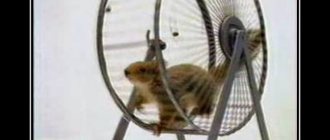Useful tips
Is talent something given from birth, or is it something that a person creates himself? The dictionary says that talent is natural giftedness, so each of us is born with our own talents.
But we must nurture and develop what is given to us at birth. However, not everyone immediately understands what they are capable of. Sometimes our hidden abilities are right in front of our eyes, and we just need to dig a little for them to come to light.
How can you discover your talent? Here are five simple steps.
Origin
In psychology, talent is considered as an innate characteristic, that is, as a high level of special abilities and as the highest level of development of inclinations.
Let's understand the concepts:
Inclinations are innate anatomical, physiological and psychological characteristics of a person that provide the opportunity for better mastery of some activity.
For example, tall height and high speed of mental reactions are useful for a basketball player, long fingers and an ear for music are useful for a pianist, etc.).- Abilities are individual psychological characteristics necessary to perform some type of activity.
- Giftedness is a complex of abilities and inclinations that makes it possible to achieve greater success in any activity.
There are several levels of ability development:
- mastery is the mastery and performance of some activity to perfection, the reproduction of someone else's experience (the application of acquired knowledge and mastered techniques in practice);
- talent is not only the masterful performance of some activity, but also the creation within its framework of something new, unique, creative (developing one’s own methods and techniques, conducting research, discoveries);
- genius (achieved only by a few) is a combination of the highest level of giftedness and talent, manifested in different areas of activity.
They say that a talented person is talented in everything, but this is not entirely true. A person of genius is brilliant in many ways because his brain works differently, the structure and mechanism of the psyche goes beyond the norm. But a person more often becomes talented in one or a couple of areas, and if he makes every effort to do so.
Thus, abilities are an innate predisposition to any activity, and talent is the highest level of development of abilities.
Surely you have heard the expression: “Talent is 1% talent and 99% work.” This is true. If a person does not develop his abilities, then they will remain at the level of inclinations. Now let's talk about how to find your talent and discover it.
Each person by nature has some inclinations and abilities , and therefore the opportunity to achieve success in a particular type of activity. However, only the person himself decides to take advantage of this opportunity or not, that is, to achieve success or ruin his talent.
People's opinions don't matter
Of course, it’s worth watching other people and their successes, but listening to society that says “You won’t succeed, it’s better to quit this job and do something useful” is more expensive for yourself.
This idea was repeated by many, many people, professional psychologists, and it would seem that everyone agrees with it and would really like not to bend to the opinions of others - but it doesn’t work.
In order to achieve success, the first thing you need to do is stop paying attention to what people say. It should be remembered that those who are very sensitive to any criticism rarely really achieve heights, because every disapproving comment in their direction hurts.
Why are there so many critics around? Most often envy creative, talented and purposeful people, and therefore try to belittle them in every possible way. The main thing is not to succumb to provocations and not to respond to insults and condemnations in your direction.
Where does the search begin?
Finding talent starts with remembering what you wanted to do as a child. And also from analyzing what you like to do in the present. This will allow you to sketch out options for areas and activities in which you can try yourself.
But this alone is not enough. What to do next and how not to make a mistake with your choice? Let's look at a step-by-step algorithm for finding talent and the conditions for their implementation:
Interest .
It will provide sustainable, internal motivation. What does it mean? That, despite difficulties, fears, laziness or anything else, you will devote time to developing your talent.You will like the process itself, the content of the activity.
- Self-discipline . Motivation alone is not enough. To achieve long-term results, you need to have fortitude and developed willpower. It is closely related to self-confidence, self-acceptance and self-knowledge.
- Performance . In other words, you need to maintain yourself in a resourceful state.
- Planning . It is not enough to simply desire success in a particular activity. It is important to choose specific goals and achieve them. Remember that new goals should be a little more difficult than those that you have already achieved, that is, be within the zone of proximal development.
- Systematic practice . It is important to regularly pay attention to developing your talent.
Remember that an inflated level of aspirations, excessive self-criticism, perfectionism and a tendency to self-flagellation interfere with the development of talent. If you feel bad about yourself, then you need to deal with this problem first.
Obstacles on the path to self-realization
I couldn’t ignore the pitfalls on the path to self-realization. They are often the cause of failure and loss of motivation to search for talent. Therefore, it is better to find out about them in advance.
The bar of claims is too high
Often a person stagnates in one place for years because he cannot adequately assess his capabilities. As I already said, most people's hidden talents are in their infancy and they need to work hard to realize them. Only a few geniuses have a unique and pronounced gift.
It’s complete nonsense when they say that I suddenly discovered a talent in myself. I just worked hard.
John Lennon
Just because you have musical talent doesn't mean that tomorrow you can sit down and compose an opera. This means that you have a slight head start compared to non-musical people. Hard work can turn this head start into a serious advantage in the future. And if you do nothing, even a person without musical abilities will soon be able to beat you.
Therefore, having recognized some ability in yourself, do not demand too much from it, but be glad that you have it and try to invest time and effort in its development. Set small goals, achieve them and track your progress.
Lack of self-confidence
Even the brightest and most outstanding talent can be buried under a layer of self-doubt. It’s scary to imagine how many great geniuses the world has not seen because of their low self-esteem.
You must firmly believe in your future success. Even if now you have no idea what your talent is. It will definitely be found and will bring happiness to you and benefit to people.
Kinds
We have already found out that talent is a high degree of development of abilities. Therefore, in the case of types, it is more appropriate to talk about types of abilities. They come in two types:
- Are common . These are abilities that help you succeed in many activities. For example, these include the properties of attention and memory, IQ, volitional personality traits, and communication skills.
- Special . These are abilities for a specific type of activity. For example: musical, artistic, technical, literary, social and others.
Examples of other special abilities - types of talents:
- theoretical (working with abstract concepts, logical reasoning);
- practical (working with hands, applying ideas in practice);
- educational (knowledge acquisition, work with theories);
- creative (transformation of knowledge, creating something new, conducting research, testing theories in practice);
- mathematical;
- physical;
- artistic;
- linguistic;
- pedagogical;
- organizational;
- professional and others.
And also in psychology it is customary to distinguish between potential and actual abilities. The first are those that a person has, but the necessary conditions have not yet been created for their manifestation. The second are those that have already manifested themselves, that is, a need has arisen for their manifestation, and suitable conditions and circumstances have arisen.
Is it too late?
One of the most important things to understand when determining what kind of talent you have is that it is never too late.
Yes, there are exceptions - it is unlikely that an elderly woman who is well over eighty will be able to dance “Swan Lake” at the Bolshoi Theater, but! If her health allows her, she may well begin to study at home - for herself.
It's the same with everything else. If your health allows, it's never too late to try something new and learn something new. Many famous talented people found their calling when they were well over forty, and this did not stop them from achieving success.
How to find: recommendations from a psychologist
How and where can you find your talent quickly? Reach out to your Self. Answer the question: “Who am I if we discard all imposed beliefs, social roles, statuses, expectations?”
What would you like to do if you weren’t afraid of anyone or anything, if you didn’t depend on society’s assessment, if you didn’t have to think about where to get money to close a loan and how to feed your family? This is you, your talents and abilities.
Is there another way to quickly find your talents? Yes, this can be done in a few hours, for example, in 5 (maybe less). Answer a few questions (take your time, you can take breaks):
- What would I do if I had 10 minutes, a day, a week, a month, a year, 5 years to live?
- What does my future look like? Here I am 10 years later, I’m happy. What surrounds me, what led to this happiness and supports it?
Answering these questions will give you a hint. Images will appear in your head. Write them down on paper and find what connects them. This is where you need to look for your talents.
Now let’s look at a more detailed plan for finding and developing talent. How to find out your abilities and discover your talent:
Remember what attracted you in childhood, what interested you once and what interests you now.
Important: you must grasp the inner drive, the true motivation to do this.That is, if something attracts you because with its help you can become famous, gain public approval or make good money - this does not mean that you have the ability for this type of activity.
But if something is literally bursting out, then that’s where you should look for your talent.
- Take psychological tests. For example, a test to determine general abilities (properties of memory and attention, type of intelligence) and tests to determine special abilities (Bennett test to determine technical abilities, Massachusetts Test of Auditory Perception, Rybakov test and others).
- Chat with relatives and friends. Sometimes you know better from the outside. You may not have noticed how you blossom when you engage in some kind of activity, but your friends have seen it. Or someone remembers you when you were very young and can tell you what you liked to do before.
- Use someone else's example. Special abilities can only be determined in the process of activity, that is, you will not learn about the artist’s talent unless you pick up a pencil and try to draw something. So don’t be afraid to try new things and master different types of activities.
Where to get ideas? Communicate with people of different professions, and also gain insight into the experiences of those people who attract you. The main thing is to be active and look for a response in your soul.What you can become talented at will come quite easily and arouse great interest. Of course, it will not be possible without difficulties, but these will be less difficulties than in the type of activity for which there is no ability.
- Regularly devote time to your hobby. At least 20 minutes daily.
When is the best time to look for and discover talent? In childhood. However, this does not mean that abilities cannot be developed in adulthood. It is possible, but it will be more difficult to do, because the brain of an adult is not as plastic as that of a child.
And adults also become hostages of social statuses, roles, and systems. Actually, this is how talents bury themselves: “Don’t be foolish,” “You won’t feed yourself and your family with this,” “You should follow in the footsteps of your parents, that is, be a doctor,” etc.
Children are far from all this, so they just do what they want .
And then everything depends on the parents: they guide and support or suppress the child’s aspirations. How to identify, find and reveal a child’s hidden talent? Observe him in the process of activity. If he loves construction sets and often takes toys apart to look inside and understand the mechanism of operation, then he has expressed technical abilities.
If a child behaves at ease around other people, loves attention (singing, reading poetry), copies the behavior and speech of others, then he has artistic talent. If a child looks at the music teacher with enthusiasm and reaches for the instrument, then he has musical talent, etc.
How can an adult find his talents, abilities and reveal them? Also: watch yourself . Even better, remember yourself as a child and become an understanding and guiding parent for yourself.
In an adult, talents are hidden not only behind social responsibilities, roles and statuses, but also behind psychological problems. If you understand that you want to do something, but something is keeping you at the same point, then understand the underlying reasons and work through them.
Why look for hidden talents and abilities?
Before we get started with the search itself, let's figure out what this is for. The benefits of talent development may not be obvious to everyone. A person lives a quiet, measured life, works from call to call and does not think about any global ambitions. Many people live like this, so why should he bother?
So 5, 10, 15 years can pass... And one fine day the whole burden of the disgusting routine from which he has been trying to hide these years falls on a person. And with it the realization of the worthlessness of his life and the desire to return everything back.
The desire for self-realization is inherent in human nature itself. This is a natural and inalienable need, without which we will not feel like full-fledged individuals. Look at the famous pyramid of A. Maslow. In the uppermost triangle there is the inscription “Self-realization”. If you have reached this level and successfully completed it, we can assume that you have completed the quest called “Life” and emerged victorious.
And if you are stuck on steps 2-3 and are not doing anything to move higher, you are literally betraying yourself. Sooner or later you will have to pay for such a careless attitude, as I already said. Evolution needs strong, ambitious individuals who, to the best of their abilities, strive to make the world at least a little better. And she mercilessly rejects the lazy and mediocre.
Well, did I manage to convince you of the need to find your purpose and discover your talents? Then put your feet up and go!
My experience
What did I like to do as a child? Play musical instruments (in the end, my parents sent me to a music school to study piano), sing, dance, write poems and fables, perform on stage or be the center of attention at home, make crafts (origami, applique, embroidery, knitting, sewing etc.), parody other people.
I also liked solving puzzles, reading, analyzing, solving riddles, and participating in quizzes. It turns out that these are artistic, literary, theoretical, musical and creative abilities.
Was I able to develop any of this to the level of talent? I find it difficult to answer. I think I chose the direction of literary, theoretical and social skills. In my opinion, they make themselves felt in the work of a copywriter. However, I cannot say that I have reached the level of talent. There is still something to strive for.
What happened to the other abilities? Sometimes I sit down at an instrument or do some handicrafts. But this remains at the level of a hobby. Most of the effort is spent on developing literary and theoretical abilities.
Own observations
You can also watch other people to find your own talent. No, this does not mean at all that you need to compare yourself with them. It’s just that in most cases it happens that a writer, scrolling through his Twitter feed, catches himself thinking, “Wow, how competently this person conveyed the whole essence,” and a photographer, looking through someone’s page on Instagram, thinks, “What a good angle! And the processing is just right, apparently the photo was taken by a professional.” And such seemingly insignificant little things are far from uncommon.
In conclusion
Talent is like a torch that illuminates our existence, because the work in which we are talented will always bring pleasure and true joy. Unfortunately, life circumstances sometimes force you to turn away from this light, but, what’s even worse, over time it can fade away. So remember, you can always rekindle that fire. The main thing is to be able to see it. Then it will warm your existence and illuminate the paths of life.
We wish you good luck!
We also recommend reading:
- Storytelling
- Empathetic intelligence
- 5 Ways of Thinking
- Two Ways of Thinking by Carol Dweck
- 5 ways to develop a talent for happiness
- Questions to Find Meaning and Happiness
- The Myth of Genius
- Fixed Mindset
- Talent vs ability. What's more important?
- Exercises for self-development
- Vitality Quotient VQ: What is it and why is it important?
Key words: 1LLL, 1Self-knowledge











